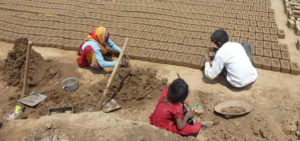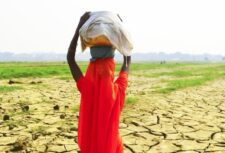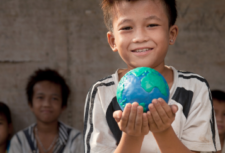Disclaimer: This article is more than 8 years old, and may not include the most up-to-date information or statistics. Please verify information with more recent sources as needed, and if you have any questions contact our Press Office.
04 August 2015
Slavery included in UN development goals: Great news for people in slavery and good victory for Anti-Slavery International
By Dr Aidan McQuade, Director

The pending inclusion of slavery as a target in the post 2015 Sustainable Development Goals (SDGs) is a victory for a long campaign that Anti-Slavery began in 2007. The UN is yet to vote the agreed text through in September but that should only be a formality.
Slavery arises at the conjunction of vulnerability and prejudice. Most commonly people are vulnerable because of their material poverty, but it can take other forms such as vulnerability to threat of physical violence or, increasingly, being forced to migrate. Couple that with prejudice against migrant workers that is widespread across the world along with racist, caste or sexist prejudice and you get big groups of people very vulnerable to slavery.
Putting slavery on the agenda of world’s development agencies is therefore of utmost importance and including slavery in the SDGs is crucial for that.
In 2007, at a conference organised by the UK Department for International Development to mark the 200th anniversary of the abolition of the transatlantic slave trade, I highlighted how slavery eradication must be recognised as a fundamental development issue. This is a matter that Anti-Slavery developed further in a short paper.
I reiterated the matter over the years at various conferences and meetings with ministers and academics. The launch of the Guardian’s slavery website in 2013 gave the opportunity to bring the argument to a wider audience.
Then I noted that, “slavery occurs to those deliberately or unthinkingly excluded from social and economic development, justice and rule of law. That is a human rights issue and also a political one. Any development project that does not recognise this threatens to overlook some of the intractable problems of poverty that continue to plague the world.”
The decisive moment in forcing the idea of slavery onto the sustainable development agenda occurred in late 2013 however, at a conference called by Pope Francis in the Vatican. I attended with the principle purpose of obtaining recognition by the conference of the fundamental inter-relationship between slavery and development. It felt like perhaps a last cast of the die to get the issue of slavery onto the international development agenda.
As a result of my interventions, the call for slavery eradication to be included in the post-2015 goals became the second item of the communique from the conference, and something which Pope Francis subsequently spoke out on publicly. With the endorsement of the Pope something of a critical mass started to form around the issue, with the British Government, particularly its Anti-Slavery Commissioner Kevin Hyland, Jeffrey Sachs, an adviser to the UN Seceretary-General Ban Kyi-Moon, and others endorsing the idea.
The inclusion of the idea in the Sustainable Development Goals is not the beginning of the end of the struggle against slavery. It is merely the end of the beginning. Further work is required to ensure that slavery is not overlooked by development actors amongst the almost bewildering array of targets.
And further strategies have to be forged from these aspirations to turn them into a reality for the 21 million people in slavery who were substantially overlooked by the development processes guided by the Millennium Development Goals.
Follow Aidan on twitter: @the_mcquade





